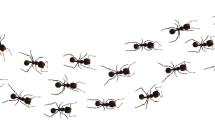Abstract
This paper contributes to the understanding of economic strategic behaviors in inter-temporal settings. Comparing the MPE and the OLNE of a widely used class of differential games it is shown: (i) what qualifications on behaviors a markov (dynamic) information structure brings about compared with an open-loop (static) information structure, (ii) what is the reason leading to intensified or reduced competition between the agents in the long run. It depends on whether agents’ interactions are characterized by markov substitutability or markov complementarity, which can be seen as dynamic translations of the ideas of strategic substitutability and strategic complementarity (Bulow et al. 1985, Journal of Political Economy 93:488–511). In addition, an important practical contribution of the paper for modelers is to show that these results can be directly deduced from the payoff structure, with no need to compute equilibria first.
Similar content being viewed by others
References
Amir, R. (2003). Stochastic games in economics and related fields I: A general survey. In A. Neyman & S. Sorin (Eds.), Stochastic games. NATO Advanced Science Institutes Series D: Behavioural and Social Sciences. Dordrecht and Boston: Kluwer Academic Publishers.
Bulow J., Geneakoplos J., Klemperer P. (1985) Multimarket oligopoly: Strategic substitutes and complements. Journal of Political Economy 93: 488–511
Cartigny P., Michel Ph. (2003) On the selection of one feedback nash equilibrium in discounted linear-quadratic games. Journal of Optimization Theory and Applications 117(2): 231–243
Dockner E.J. (1992) A dynamic theory of conjectural variations. The Journal of Industrial Economics 40(4): 377–395
Dockner E.J., Jorgensen S., Van Long N., Sorger G. (2000) Differential games in economics and management science. Cambridge University Press, Cambridge
Dockner E.J., Long N.V. (1993) International pollution control: Cooperative versus non cooperative strategies. Journal of Environmental Economics and Management 24: 13–29
Driskill R.A. (2001) Durable goods oligopoly. International Journal of Industrial Organization 19: 391–413
Driskill R.A., McCafferty S. (1989) Dynamic duopoly with adjustment costs: A differential game approach. Journal of Economic Theory 49: 324–338
Feenstra T., Kort P.M., De Zeeuw A. (2001) Environmental policy instruments in an international duopoly with feedback investment strategies. Journal of Economic Dynamics and Control 25: 1665–1687
Fershtman C. (1984) Goodwill and market share in oligopoly. Economica 51(203): 271–281
Fershtman C., Nitzan S. (1991) Dynamic voluntary provision of public goods. European Economic Review 35: 1057–1067
Figuières C. (2002) Complementarity, substitutability and the strategic accumulation of capital. International Game Theory Review 4(4): 371–390
Figuières C., Gardères Ph., Rychen F. (2002) Infrastructures publiques et politiques de développement décentralisées. l’Actualité Economique 78(4): 539–570
Fudenberg D., Tirole J. (1983) Capital as commitment: Strategic investment to deter mobility. Journal of Economic Theory 31: 227–256
Itaya J., Shimomura K. (2001) A dynamic conjectural variation model in the private provision of public goods: A differential game approach. Journal of Public Economics 81: 153–172
Lockwood B. (1996) Uniqueness of Markov-perfect equilibrium in infinite-time affine-quadratic differential games. Journal of Economic Dynamics and Control 20: 751–765
Long N.V., Shimomura K., Takahashi H. (1999) Comparing open-loop with Markov equilibria in a class of differential games. Japanese Economic Review 50(4): 457–469
Maskin E., Tirole J. (2001) Markov perfect equilibrium I. Observable actions. Journal of Economic Theory 100: 191–219
Melese F., Michel Ph. (1991) Reversing the arms race: A differential game model. Southern Economic Journal 57(4): 1133–1143
Papavassilopoulos G., Cruz J. (1979) On the uniqueness of Nash strategies for a class of analytic differential games. Journal of Optimization Theory and Applications 42: 551–560
Piga C. (1998) A dynamic model of advertising and product differentiation. Review of Industrial Organization 13: 509–522
Reynolds S. S. (1985). Capacity investment and preemption: A differential game analysis, Discussion Paper No, 85-16, University of Arizona, pp. 69-88.
Reynolds S.S. (1987) Capacity investment, preemption and commitment in an infinite horizon model. International Economic Review 28(1): 69–88
Spence A.M. (1979) Entry, capacity, investment and oligopolistic pricing. Bell Journal of Economics 8: 534–544
Starr A.W., Ho Y.C. (1969) Nonzero-sum differential games. Journal of Optimization Theory and Applications 3: 184–206
Tutsui S., Mino K. (1990) Non-linear strategies in dynamic duopolistic competition with sticky prices. Journal of Economic Theory 52: 136–161
Van Der Ploeg F., De Zeeuw A.J. (1990) Perfect equilibrium in a model of competitive arms accumulation. International Economic Review 31(1): 131–146
Wildasin D.E. (1991) Some rudimentary ‘duopolity’ theory. Regional Science and Urban Economics 21: 393–421
Wirl F. (1996) Dynamic voluntary provision of public goods: Extension to nonlinear strategies. European Journal of Political Economy 12(3): 555–560
Worthington P.R. (1969) Strategic investment and Conjectural Variations. International Journal of Industrial Organization 8: 315–328
Author information
Authors and Affiliations
Corresponding author
Additional information
I dedicate this paper to Philippe Michel, who introduced me to the literature on differential games.
Rights and permissions
About this article
Cite this article
Figuières, C. Markov interactions in a class of dynamic games. Theory Decis 66, 39–68 (2009). https://doi.org/10.1007/s11238-008-9123-1
Received:
Accepted:
Published:
Issue Date:
DOI: https://doi.org/10.1007/s11238-008-9123-1




